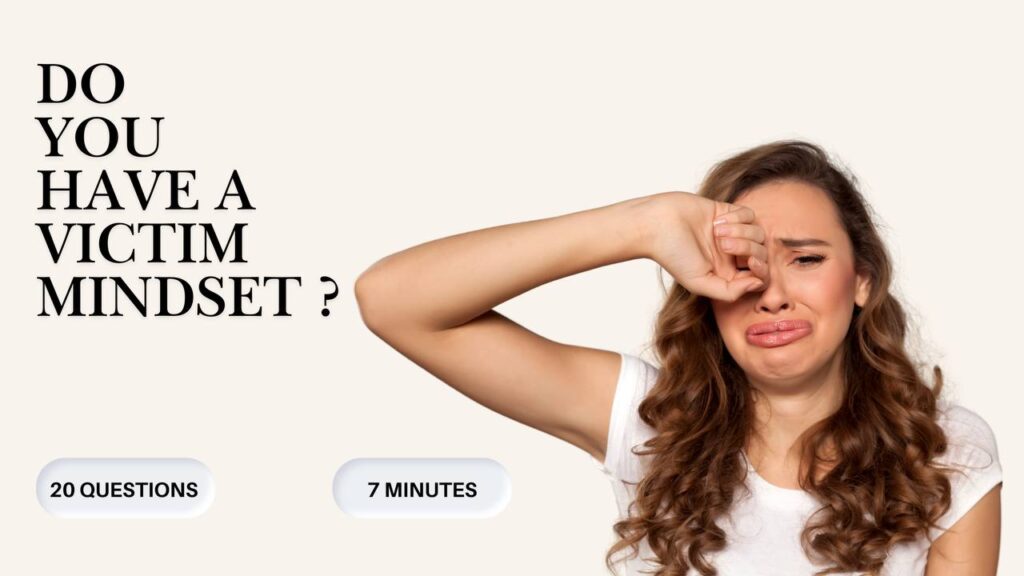
Results
High Victim Mindset
- What This Means: Your responses suggest a strong tendency to perceive yourself as a victim in many situations.
- Insights:
- Often feel powerless or blame others for challenges.
- Struggle to take ownership of circumstances or seek proactive solutions.
- This mindset may hinder personal growth and create barriers in relationships.
- Next Steps:
- Reflect on areas where you can take control and initiate change.
- Practice gratitude to shift focus from negativity to positivity.
- Consider working with a therapist or counselor to reframe thought patterns.
Moderate Victim Mindset
- What This Means: Your responses indicate a tendency to occasionally adopt a victim mindset, especially in challenging situations.
- Insights:
- May sometimes feel stuck or blame external factors for setbacks.
- Capable of taking responsibility but may struggle during tough times.
- Likely aware of the impact of this mindset but need strategies to overcome it.
- Next Steps:
- Identify specific triggers that lead to victim thinking and address them.
- Develop problem-solving skills and focus on actionable steps.
- Seek support from trusted individuals to gain perspective and encouragement.
Balanced Perspective
- What This Means: Your responses suggest a balanced perspective, acknowledging challenges without over-identifying as a victim.
- Insights:
- Generally take responsibility for your actions while recognizing external factors.
- Likely able to learn and grow from setbacks without dwelling on them.
- Capable of maintaining a positive outlook while addressing difficulties.
- Next Steps:
- Continue fostering resilience by focusing on solutions rather than obstacles.
- Reflect on successes and challenges to enhance self-awareness.
- Share your balanced approach with others to inspire and support them.
Proactive Problem-Solver
- What This Means: Your responses indicate a strong ability to avoid a victim mindset, focusing on solutions and personal accountability.
- Insights:
- Likely face challenges head-on and take ownership of outcomes.
- Rarely blame others or external circumstances for difficulties.
- Well-equipped to inspire confidence and positivity in others.
- Next Steps:
- Continue using your proactive approach to overcome obstacles.
- Reflect on how this mindset has contributed to your growth and success.
- Mentor others to help them adopt a similar approach to challenges.
Empowered and Resilient
- What This Means: Your responses suggest a highly empowered mindset, with little to no tendency to adopt a victim role.
- Insights:
- Strongly believe in your ability to create change and influence outcomes.
- Approach life with resilience and a focus on personal growth.
- Likely inspire and motivate others through your example.
- Next Steps:
- Use your strengths to tackle even greater challenges and opportunities.
- Reflect on ways to empower others who may struggle with a victim mindset.
- Continue cultivating gratitude and resilience to maintain your positive outlook.
#1. I do not have control over problematic situations that I encounter.
#2. I find that there is usually someone to blame when bad things happen to me.
#3. Life is stacked against me.
#4. When people offer me constructive feedback, it feels like a personal attack.
#5. I believe the world is generally fair.
#6. I often think about the injustices others have done to me.
#7. People should apologize when they have offended me.
#8. I give more to others than I get from them.
#9. I am filled with anger whenever I remember someone who hurt me.
#10. People often take advantage of me.
#11. It bothers me when people do not believe I feel hurt.
#12. People need to admit they are wrong when they hurt or offend me.
#13. I usually receive fair treatment.
#14. My mind often replays situations in which others disrespected or took advantage of me.
#15. It is satisfying when people recognize how much unfairness I have experienced.
#16. Life is inherently unfair.
#17. I have to work hard to make up for the damage others do.
#18. It is easier for me to think of what has gone wrong in my life than what has gone right.
#19. When I experience unfairness, it is usually the result of other people’s intent.
#20. Letting others know how I have been harmed respects the pain I have experienced.
Previous
Finish


